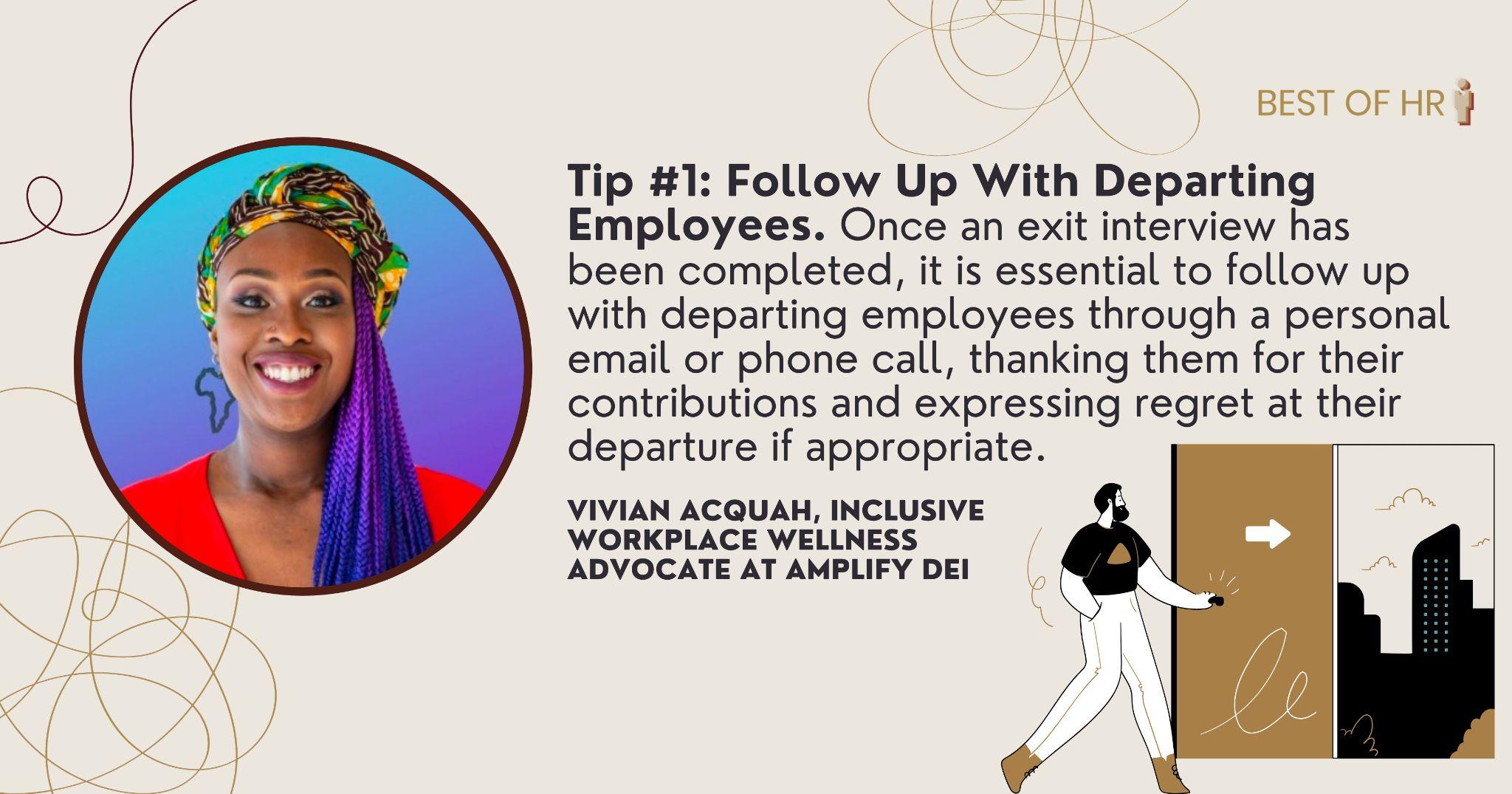What are some exit interview best practices?
From “Take the time to implement valuable feedback” to “Sending questions ahead of time”, here are the 10 answers to the question, “What is one best practice when it comes to conducting an exit interview? “
- Take the Time to Implement Valuable Feedback
- Ask Employees What They Would Change
- Be Open to Constructive Criticism
- Ask Open-ended Questions
- Take Detailed Notes During the Interview
- Listen to Learn
- Ask: “Would You Recommend This Company to Your Friend?”
- Appoint Someone New to Run the Exit Interview
- Follow Up With Departing Employees
- Sending Questions Ahead of Time
Take the Time to Implement Valuable Feedback
Actually take time to implement the relevant feedback you gather from your exit interview. As a CEO, I believe it’s important to take the time to consider and weigh out the feedback your employees provide during an exit interview. After all, it is their experience within the company which will help you improve your business practices and create a better working environment for everyone in the future. It is not enough just to listen – taking action based on the feedback is essential. That way, you can ensure that your employees feel heard and valued, while also making sure your business is running as efficiently and effectively as possible.
Michael Fischer, Founder, Elite HRT
Ask Employees What They Would Change
Ask what the departing employee would change. This is an important question for two reasons: first, it gives you insight into issues you may not know exist; and second, it may help you with retention going forward. It’s not always the case that employees leave for financial reasons. Sometimes, they’re driven out by bad systems or processes. By asking outgoing employees what changes they would make to their role or department, you can identify possible trends and areas for change.
Rachel Roff, Founder, CEO, Urban Skin Rx
Be Open to Constructive Criticism
One best practice when conducting an exit interview is to be unbiased and objective. It is important to listen to the departing employee’s perspective and gather honest and constructive feedback without making judgments or taking things personally. By listening to their comments you are able to improve upon any current processes and make sure it is not a pain point for a future employee.
Trey Ferro, CEO, Spot Pet Insurance

Ask Open-ended Questions
Ask open-ended questions, instead of leading questions and try to encourage the employee to speak candidly about their experiences and observations. Exit interviews can be a valuable source of feedback for an organization, as they provide an opportunity for departing employees to share their thoughts and experiences about working for the company. By keeping the questions open-ended, you can gather much more information instead of simply confirming your own bias.
Dennis Consorte, Digital Marketing & Leadership Consultant for Startups, Snackable Solutions
Take Detailed Notes During the Interview
Take detailed notes to ensure you are always learning from the actions of others. An exit interview is a valuable opportunity to learn from an employee’s perspective on the organization, their roles and responsibilities, and any challenges or successes they experienced.
Asking detailed questions about their time with the company will help you identify areas for improvement in your operations, processes, culture, and more. It’s also important that employees feel listened to and appreciated, so be sure to let everyone know that your organization values their feedback and is open to change.
A successful exit interview should result in both a better understanding of the employee’s experience and a more informed strategy for the future. When conducted properly, an exit interview can be beneficial for both employers and employees alike!
Asker Ahmed, Director & Founder, iProcess
Listen to Learn
Exit interviews can provide value and constructive feedback to help businesses improve employee retention and turnover when they are conducted the right way. This requires the right mindset. Interviewers must keep an open-minded attitude and be careful not to take a confrontational tone. A comfortable environment promotes candid responses.
Derek Colvin, Attorney, Waldrop & Colvin
Ask: “Would You Recommend This Company to Your Friend?”
Ask a question: “Would you recommend this company to your friend?” [+”If no, why not?”]. Including this simple yet revealing question in an exit interview is a great idea, as the answer may help you get insights into what you do well and what can be improved. It goes beyond a “regular” employee satisfaction level.
We tend to be more demanding when it comes to choosing something for our nearest and dearest. Therefore, willingness to recommend a certain company as a good one to work for to a friend is a reliable indicator of employee satisfaction. A sole declaration that we like a company or not and rating it from 1 to 10 is not that powerful, I believe.
Agata Szczepanek, Community Manager, LiveCareer
Appoint Someone New to Run the Exit Interview
Appoint someone other than the regular day-to-day manager to run the exit interview if at all possible. This way, the interviewee can feel confident that anything they say won’t be held against them. Additionally, someone outside the usual chain of command may be better able to ask unbiased questions and get a more honest picture of the employee’s experience. It’s also important to make sure that exit interviews are conducted in private and confidential as they are no one else’s business.
Yusuf Shurbaji, Co-Founder & Managing Partner, Prismfly
Follow Up With Departing Employees
Exit interviews are critical to any organization’s recruitment, retention, and overall success. They ensure a secure transition of information from departing employees and provide invaluable insight into potential improvements in the workplace culture and areas for future development. Here is one best practice you can use while conducting your exit interviews to ensure that all parties involved have an inclusive and respectful experience. Tip #1: Follow Up With Departing Employees. Once an exit interview has been completed, it is essential to follow up with departing employees through a personal email or phone call, thanking them for their contributions and expressing regret at their departure if appropriate. This shows that the organization values its former employees and encourages open communication between current and former staff members in order for organizations to remain competitive in today’s market.
Vivian Acquah, Inclusive Workplace Wellness Advocate, Amplify DEI

Sending Questions Ahead of Time
I find it very helpful to send a few questions to the exiting employee before we meet face-to-face or virtually. This allows them to put some thought into the types of questions that I might ask, and often times it creates a more honest and better overall conversation.
My main objective when conducting these is to try and identify ways that we can improve the employee experience in the future. Whether it’s learning from mistakes that might have been made during that employee’s tenure or reinforcing things that we’re doing well, the benefits of these conversations are limitless.
Tim Hiller, Senior Manager, Surety Systems
Submit Your Answer
Would you like to submit an alternate answer to the question, What is one best practice when it comes to conducting an exit interview?

